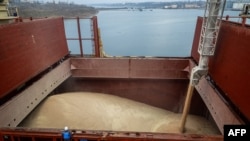Romania and Poland are in talks with the European Commission over export tracing mechanisms for Ukrainian grains to ensure local farmers are not hurt by a flood of cheap imports, the Polish and Romanian prime ministers said on Tuesday.
Ukraine, one of the world's largest grain exporters, has seen its Black Sea ports blocked since Russia invaded more than a year ago and has been forced to find alternative shipping routes through European Union states Poland and Romania.
But logistical bottlenecks mean that large quantities of Ukrainian grains, which are cheaper than those produced in the European Union, have ended up in central European states, hurting prices and sales of local farmers.
Romanian and Polish Prime Ministers Nicolae Ciuca and Mateusz Morawiecki told a business conference in Bucharest their governments were working on solutions with the EU.
"Together we are engaged in a process to discuss with the European Commission about what the mechanisms should be to enforce the traceability of Ukrainian exports and final destinations," Ciuca said.
Morawiecki said they "are fighting together for this grain to leave our countries, for the European Union to effectively help us in the implementation of trade policy, which is in the best strategic interest of Ukraine and Central Europe, but also in the best economic interest of Poland and Romania."
Earlier this month, Romanian Agriculture Minister Petre Daea said the European Commission has estimated farmers from Poland, Romania, Hungary, Bulgaria and Slovakia have lost $451.15 million overall from the inflows of cheaper Ukrainian grains on their markets.
Daea also said the Commission aimed to hand out compensation worth 56.3 million euros to Polish, Bulgarian and Romanian farmers, with a final decision expected on March 30.





